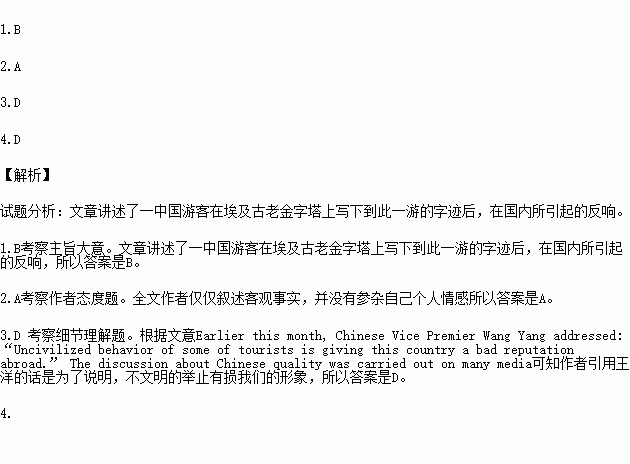题目内容
In May, 2014, some Chinese tourists found a Chinese-character message “Ding Jinhao once visited here” on a statue of god in a 3500-year-old Egyptian temple. An angry tourist took the photograph of the scrawl and posted it on social media Sina Weibo. It was quickly spread and there were more than 100,000 comments during two weeks. Later, a 15-year-old Chinese boy was searched out as the person who caved this message. Many netizens expressed their anger and disappointment for the uncivilized behavior. They searched and identified the boy and then posted his personal information including the address and pictures online.
Over the weekend, his school’s website was hacked, and reporters flooded into his home in the city of Nanjing. Besieged by reporters, the child’s mother offered a formal apology for her son’s behavior. “We want to apologize to the Egyptian people and to people who have paid attention to this case across China.” the boy’s mother told the local newspaper.
With China’s economy booming over the past decades, a growing number of the country’s residents have become global tourists. Earlier this month, Chinese Vice Premier Wang Yang addressed: “Uncivilized behavior of some of tourists is giving this country a bad reputation abroad.” The discussion about Chinese quality was carried out on many media.
On the bright side, Egypt government described the damage to the temple as superficial(表面的)and could be restored and they would forgive the boy. While the act of Ding Jinhao symbolizes a national shame, meanwhile, many people concern about the child’s development and wish he could return to anonymity once more. “The boy has known his mistake and cried all night. He has to be moved around because reporters rushes to his house for interviews.” said a reporter who talked with the parents.
1.The passage is mainly about ________.
A. Chinese tour in Egypt
B. the wave caused by Chinese uncivilized behavior
C. the discussion on Chinese education
D. the importance of Weibo
2.What is the netizens’ attitude towards Ding’s behavior?
A. Critical. B. Doubtful.
C. Tolerant. D. Supportive.
3.The writer uses the quotation by Vice Premier Wang Yang to show ________.
A. Chinese people are influential
B. China is a civilized country
C. People shouldn’t go abroad
D. Some misconducts are bad for our image
4.From the last paragraph, we know ________.
A. the boy wasn’t hurt
B. the boy has caused irreparable(不可挽回的)damage to the statue
C. the boy has escaped from the public attention
D. many people hope the boy can live back a normal life

